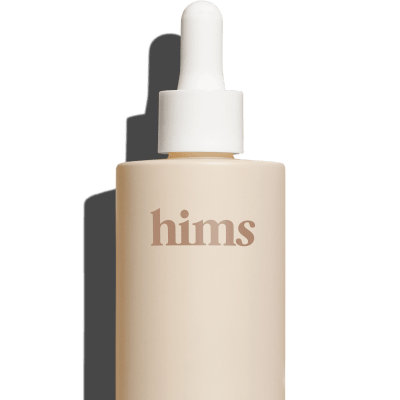Content
FDA approved for more than 25 years
Ketoconazole Shampoo for Hair Loss: Does It Work?

If you’ve tried FDA-approved medications like finasteride and minoxidil for hair loss and haven’t seen improvements or have been experiencing side effects, you might be agonizing over what to do next. Is ketoconazole shampoo for hair loss an option?
This topical antifungal medication is typically used to treat skin infections. However, there is also some evidence that it may help with hair loss due to conditions like androgenetic alopecia, also known as male pattern baldness.
But is this topical treatment actually effective? And does it have any notable side effects? Below, we outline what to know about this potential hair loss treatment alternative, including what the research says about its efficacy, how it works for hair loss, and more.
Content

What Is Ketoconazole?
Ketoconazole is a medication that treats a range of fungal infections. It belongs to a class of antifungal medications called imidazoles and works by slowing the growth of fungi that cause infection.
However, because ketoconazole is an older antifungal medication, it’s not usually a first-line treatment. Instead, it is typically used when other treatments aren’t available or haven’t worked.
You can get ketoconazole as an oral medication or as a topical medication in the form of a cream, foam, or shampoo. Weaker formulations are available over the counter, but you’ll need a prescription for stronger versions.
Topical ketoconazole cream can treat issues such as:
Tinea corporis (ringworm)
Tinea cruris (jock itch)
Tinea pedis (athlete’s foot)
Yeast infections
Meanwhile, ketoconazole shampoo can treat:
Tinea versicolor (a skin fungal infection)
Seborrheic dermatitis (aka dandruff)
Flaking, scaling, and itching on the scalp
Ketoconazole shampoo (offered under the brand name Nizoral®) is available in two strengths:
1% or less ketoconazole shampoos: These products contain a weaker concentration of ketoconazole. You can buy them over the counter, usually as an anti-dandruff shampoo.
2% ketoconazole shampoos: These medicated shampoos are only available by prescription and are usually used to treat fungal infections and seborrheic dermatitis.
You can also find shampoos that combine ketoconazole with other ingredients, such as salicylic acid or pyrithione zinc. These are often formulated to treat problematic dandruff and other scalp conditions.
A systematic review of seven ketoconazole studies (two animal studies and five human studies) found that ketoconazole seems to positively affect hair’s appearance.
However, the U.S. Food and Drug Administration (FDA) has not approved it as a hair loss treatment.
Further, limited research exists on ketoconazole for hair loss. Available research shows that other hair loss treatments, like minoxidil, are just as (if not more) effective.
Many studies on ketoconazole for hair loss are also small. They most often involve 2% ketoconazole shampoo, which is stronger than the 1% products you'll find in drug stores.
Ketoconazole Shampoo for Female Pattern Baldness
A small 2019 study looked at 40 women with androgenetic alopecia (which refers to both male pattern baldness and female pattern hair loss).
Twenty women were treated with a 2% ketoconazole shampoo, and the other 20 were treated with a 2% topical minoxidil solution (minoxidil is often sold under the brand name Rogaine®). Participants applied the treatments daily for six months.
The results after six months showed that both ketoconazole and minoxidil were effective at promoting hair growth. But minoxidil showed results two months earlier.
Still, the researchers concluded that more studies into higher concentrations of ketoconazole shampoo are needed.
Ketoconazole Shampoo for Male Pattern Baldness
Older research from 1998 found that ketoconazole shampoo worked just as well as minoxidil for men with male pattern baldness.
Both treatments increased hair density and size, and the amount of anagen hair follicles (hair follicles in the growth phase of the hair growth cycle).
Another small study from 2011 examined 15 men with male pattern baldness. The men used a topical hair loss treatment called NuH Hair, which combined finasteride, dutasteride, and minoxidil. Participants also had the option to add Rogaine, Propecia®, and ketoconazole shampoo to their regimen.
All 15 men noticed significant hair growth by the end of the experiment. Those who just used NuH Hair saw hair growth after three months, while those who used NuH Hair with the additional treatments saw hair growth in as little as 30 days.
However, it’s unclear which additional treatments the men used, so we can’t say for sure if ketoconazole is the reason for hair growth here.
What this research does show is that aggressive treatment can produce quicker results for your hairline.
Ketoconazole Shampoo for Tinea Capitis
Tinea capitis, or scalp ringworm, is a fungal infection of the scalp hairs. Along with an uncomfortable rash, you might experience hair shedding and scarring alopecia, which is permanent hair loss caused by the destruction of hair follicles.
Tinea capitis is often treated with oral antifungal medications, but antifungal shampoos — like ketoconazole shampoo — may be used as part of a treatment plan.
So, if your hair loss is caused by tinea capitis, ketoconazole can help.
Ketoconazole Shampoo for Seborrheic Dermatitis
Research unequivocally supports the idea that topical application of ketoconazole helps treat seborrheic dermatitis (aka dandruff), a condition affecting nearly 12 percent of the adult population.
Seborrheic dermatitis is a chronic condition that typically requires ongoing treatment — so ketoconazole isn’t a one-and-done treatment. Long-term use is often necessary.
While seborrheic dermatitis doesn’t cause permanent hair loss, some research has found that Malassezia, a fungi contributing to dandruff, is linked to hair shedding.
This type of hair loss isn’t caused by genetics and is largely unrelated to male pattern baldness. Ketoconazole decreases Malassezia colonization and acts as an anti-inflammatory.
All of which to say, if you have dandruff, flaking, or other scalp conditions, plenty of research supports using ketoconazole.
more hair... there's a pill for that
Ketoconazole is linked to hair growth, but it’s not entirely clear how exactly it works.
Some experts believe that ketoconazole impacts the hormone dihydrotestosterone (DHT). DHT is responsible for the development of male genitalia before birth and facial and body hair growth during puberty. It’s also responsible for male pattern baldness.
DHT binds to androgen receptors in the hair follicles and causes the miniaturization of said follicles. This leads to thinner and shorter follicles and, eventually, signs of hair loss, like a receding hairline or a bald patch around the crown of the head.
Some hair loss treatments inhibit the conversion of testosterone to DHT. Less DHT in your system means less hair follicle miniaturization, leading to slowed hair loss and sometimes hair regrowth.
Medications like finasteride dramatically decrease the amount of DHT in your body. But it’s unclear if ketoconazole can do the same.
A 2004 scientific paper suggested that ketoconazole 2% shampoo can disrupt the DHT pathway, potentially inhibiting DHT production or stopping the hormone from binding to androgen receptors.
Using ketoconazole shampoo and finasteride together could more completely block the DHT pathway and, therefore, be a more effective treatment for male pattern baldness.
However, more research is needed to understand how these medications might work together.
But if your hair loss is caused by a fungal scalp infection, ketoconazole’s antifungal properties can treat the infection, stopping the related hair loss and allowing healthy hair to grow back.
Will you join thousands of happy customers?
4.5 average rating
How to Use Ketoconazole Shampoo
Use ketoconazole shampoo like you would a regular shampoo.
Here’s what to do:
Wet your hair thoroughly.
Apply the shampoo evenly to your hair and scalp
Massage the shampoo with your fingers until it lathers up.
Rinse the shampoo out of your hair.
Repeat steps if needed.
Always follow the instructions listed on the ketoconazole shampoo you’re using or any directions you’re given by a prescribing healthcare provider or dermatology professional. And don’t use the shampoo if your scalp is irritated, cut, or broken.
Don’t swallow ketoconazole shampoo, and try to avoid getting it in your eyes or mouth. Should you get it in your eyes, rinse them with plenty of water.
If you’re using ketoconazole shampoo to treat an infection, you may only need to apply it once. To treat dandruff, you may need to apply the shampoo every three to four days for up to eight weeks and then as needed. It’s not clear how often you should apply ketoconazole shampoo for hair loss.
Where to Get Ketoconazole Shampoo
You can get 1% or less ketoconazole shampoo over the counter at your local drug store or supermarket. Look out for certain products advertised as dandruff treatments, like Nizoral shampoo.
For stronger formulations, you’ll need to speak to a healthcare professional. However, keep in mind most medical professionals won’t prescribe ketoconazole for male pattern hair loss.
If you think your hair loss may be the result of a scalp fungal infection though, it’s worth consulting a dermatologist or your primary care provider.
Want to learn more about your shampoo options? Our guide to what to look for in a men’s hair loss shampoo can help.
Ketoconazole Side Effects
Side effects from ketoconazole are rare. In the 2019 study we mentioned earlier comparing ketoconazole shampoo to minoxidil, only 10 percent of people reported side effects from ketoconazole.
But like all medications, ketoconazole comes with a risk of potential side effects, such as:
Changes in hair texture
Oily or dry scalp or hair
Scalp irritation, itching, or stinging
Dry skin
Blisters on the scalp
Ketoconazole shampoo can also remove the curl from your hair if you have a perm.
Some more serious side effects include:
Skin rash
Hives
Redness, tenderness, swelling, pain, or warmth where you apply the medication
Difficulty breathing or swallowing
If you experience any of these serious side effects, get medical advice immediately.
Oral ketoconazole has side effects, too. In 2016, the FDA limited the use of Nizoral oral tablets due to a potential risk of liver and adrenal damage. In some cases, these pills may be deemed necessary, but they’re no longer a first line of defense.
Tell your healthcare provider or pharmacist about any medical conditions and allergies to medications, creams, or shampoos. And let them know if you’re taking any other medications, nutritional supplements, vitamins, or herbal products.
Can Ketoconazole Cause Hair Loss?
Is Nizoral shampoo hair loss a thing?
Nizoral shampoo can help with dandruff and fungal infections, and it’s even been linked to hair growth. However, one uncommon Nizoral shampoo side effect includes alopecia (hair loss).
If you notice worsening hair loss when using over-the-counter ketoconazole shampoo, stop using it and switch to another treatment. If you’re on prescription ketoconazole, speak to your prescribing healthcare provider.
Ketoconazole is often promoted as one of the “big three” treatments for male pattern baldness, along with the FDA-approved medications finasteride and minoxidil.
But there isn’t enough research behind ketoconazole shampoo to call it an effective hair loss treatment.
Though currently available studies are promising, they are small and often involve 2% ketoconazole, which is only available by prescription.
Our advice? Using ketoconazole for hair loss probably won’t hurt. But consider using other science-backed hair loss treatments, either instead of or alongside ketoconazole shampoo.
Other Options for Treating Hair Loss
Looking for something backed by more research? Here are a few other treatment options for hair loss.
Minoxidil. Minoxidil is a topical product available that’s been shown to stimulate hair growth and prevent further hair loss. It may take six to 12 months to see results. Check out our minoxidil foam and minoxidil liquid solution to get started.
Finasteride. Oral finasteride is a prescription pill you take once a day. It’s FDA-approved for treating male pattern baldness and works by stopping the production of DHT. It can help slow hair loss plus promote new hair growth, though it typically takes about four months to see improvements. Finasteride generally works best if you start taking it as soon as you notice signs of hair loss or hair thinning.
A combination of minoxidil and finasteride. Minoxidil and finasteride can be even more effective when used together. We offer the pairing in our topical finasteride & minoxidil spray.
Supplements. Biotin, iron, or zinc deficiencies may contribute to hair loss. Check out our biotin gummies, which contain everything your body needs for a strong and healthy head of hair.
Microneedling. Hundreds of tiny needles pricking your scalp can stimulate hair growth. Studies show that 12 weeks of weekly microneedling, when paired with twice-a-day minoxidil use, led to significantly more hair growth than using a minoxidil treatment alone.
If you’re experiencing shedding, it’s important to speak to a healthcare professional about your hair loss. They can determine what type of hair loss you’re suffering from — such as male pattern baldness or due to a fungal scalp infection.
They’ll then be able to recommend the best treatment options for you, determining whether an option like ketoconazole shampoo or finasteride is more suitable.
Hair loss treatments, delivered
Ketoconazole shampoo for hair loss may work, especially if you are experiencing shedding as a result of a fungal scalp infection. Still, the research on ketoconazole for hair loss is much less robust than it is on FDA-approved treatments.
Here’s a quick recap on what to know:
Ketoconazole shampoo is linked to hair growth. Studies are small and show that other treatment options are just as effective, if not more, so we can’t fully back Nizoral for hair loss.
Ketoconazole is an antifungal treatment. If your hair loss is linked to scalp ringworm, a healthcare professional may recommend ketoconazole shampoo as part of your treatment plan.
There are hair loss treatments with more scientific evidence. Minoxidil and finasteride are FDA-approved for the treatment of male pattern baldness. Turn to these treatments instead of, or alongside, ketoconazole shampoo.
For the best advice, connect with a Hims licensed healthcare professional online, who can help you get to the bottom of what’s causing your hair loss and find an appropriate men’s hair loss treatment for you.
We offer a range of options, including finasteride and minoxidil. You might also consider our Hair Power Pack, which contains finasteride, minoxidil, and several other hair-friendly products.
9 Sources
- Ketoconazole Topical. (n.d.). https://medlineplus.gov/druginfo/meds/a605014.html
- Sinawe, H. & Casadesus, D. (2023, June 26). Ketoconazole - StatPearls. NCBI. https://www.ncbi.nlm.nih.gov/books/NBK559221/
- El-Garf, A., Mohie, M. & Salah, E. (2019). Trichogenic effect of topical ketoconazole versus minoxidil 2% in female pattern hair loss: a clinical and trichoscopic evaluation. biomed dermatol 3 (8). https://biomeddermatol.biomedcentral.com/articles/10.1186/s41702-019-0046-y#citeas
- Piérard-Franchimont, C., De Doncker, P., Cauwenbergh, G., & Piérard, G. E. (1998). Ketoconazole shampoo: effect of long-term use in androgenic alopecia. Dermatology (Basel, Switzerland), 196(4), 474–477. https://www.researchgate.net/publication/13616077_Ketoconazole_Shampoo_Effect_of_Long-Term_Use_in_Androgenic_Alopecia
- Rafi, A. W., & Katz, R. M. (2011). Pilot Study of 15 Patients Receiving a New Treatment Regimen for Androgenic Alopecia: The Effects of Atopy on AGA. ISRN dermatology, 2011, 241953. https://www.ncbi.nlm.nih.gov/pmc/articles/PMC3262531
- Al Aboud, A. M. & Crane, J. S. (2023, August 8). Tinea Capitis - StatPearls. NCBI. https://www.ncbi.nlm.nih.gov/books/NBK536909/
- Kinter, K. J., Amraei, R., Anekar, A. A. (2023, July 30). Biochemistry, Dihydrotestosterone - StatPearls. NCBI. https://www.ncbi.nlm.nih.gov/books/NBK557634/
- Hugo Perez B. S. (2004). Ketocazole as an adjunct to finasteride in the treatment of androgenetic alopecia in men. Medical hypotheses, 62(1), 112–115. https://www.sciencedirect.com/science/article/abs/pii/S0306987703002640?via%3Dihub
- Hair Loss: Diagnosis and Treatment. (n.d.). https://www.aad.org/public/diseases/hair-loss/treatment/diagnosis-treat
Editorial Standards
Hims & Hers has strict sourcing guidelines to ensure our content is accurate and current. We rely on peer-reviewed studies, academic research institutions, and medical associations. We strive to use primary sources and refrain from using tertiary references. See a mistake? Let us know at blog@forhims.com!
This article is for informational purposes only and does not constitute medical advice. The information contained herein is not a substitute for and should never be relied upon for professional medical advice. Always talk to your doctor about the risks and benefits of any treatment. Learn more about our editorial standards here.
Knox Beasley, MD
Dr. Knox Beasley is a board certified dermatologist specializing in hair loss. He completed his undergraduate studies at the United States Military Academy at West Point, NY, and subsequently attended medical school at Tulane University School of Medicine in New Orleans, LA.
Dr. Beasley first began doing telemedicine during his dermatology residency in 2013 with the military, helping to diagnose dermatologic conditions in soldiers all over the world.
Dr. Beasley is board certified by the American Board of Dermatology, and is a Fellow of the American Academy of Dermatology.
Originally from Nashville, TN, Dr. Beasley currently lives in North Carolina and enjoys spending time outdoors (with sunscreen of course) with his wife and two children in his spare time.
Education
Bachelor of Science, Life Sciences. United States Military Academy.
Doctor of Medicine. Tulane University School of Medicine
Training
Dermatology Residency. San Antonio Uniformed Services Health Education Consortium
Certifications
Board Certified. American Board of Dermatology
Publications
Wilson, L. M., Beasley, K. J., Sorrells, T. C., & Johnson, V. V. (2017). Congenital neurocristic cutaneous hamartoma with poliosis: A case report. Journal of cutaneous pathology, 44(11), 974–977. https://onlinelibrary.wiley.com/doi/10.1111/cup.13027
Banta, J., Beasley, K., Kobayashi, T., & Rohena, L. (2016). Encephalocraniocutaneous lipomatosis (Haberland syndrome): A mild case with bilateral cutaneous and ocular involvement. JAAD case reports, 2(2), 150–152. https://www.ncbi.nlm.nih.gov/pmc/articles/PMC4867906/
Patterson, A. T., Beasley, K. J., & Kobayashi, T. T. (2016). Fibroelastolytic papulosis: histopathologic confirmation of disease spectrum variants in a single case. Journal of cutaneous pathology, 43(2), 142–147. https://onlinelibrary.wiley.com/doi/10.1111/cup.12569
Beasley, K., Panach, K., & Dominguez, A. R. (2016). Disseminated Candida tropicalis presenting with Ecthyma-Gangrenosum-like Lesions. Dermatology online journal, 22(1), 13030/qt7vg4n68j. https://pubmed.ncbi.nlm.nih.gov/26990472/
Kimes, K., Beasley, K., & Dalton, S. R. (2015). Eruptive milia and comedones during treatment with dovitinib. Dermatology online journal, 21(9), 13030/qt8kw141mb. https://pubmed.ncbi.nlm.nih.gov/26437285/
Miladi, A., Thomas, B. C., Beasley, K., & Meyerle, J. (2015). Angioimmunoblastic t-cell lymphoma presenting as purpura fulminans. Cutis, 95(2), 113–115. https://pubmed.ncbi.nlm.nih.gov/25750965/
Beasley K, Dai JM, Brown P, Lenz B, Hivnor CM. (2013). Ablative Fractional Versus Nonablative Fractional Lasers – Where Are We and How Do We Compare Differing Products?. Curr Dermatol Rep, 2, 135–143. https://idp.springer.com/authorize?response_type=cookie&client_id=springerlink&redirect_uri=https%3A%2F%2Flink.springer.com%2Farticle%2F10.1007%2Fs13671-013-0043-0
Siami P, Beasley K, Woolen S, Zahn J. (2012). A retrospective study evaluating the efficacy and tolerability of intra-abdominal once-yearly histrelin acetate subcutaneous implant in patients with advanced prostate cancer. UroToday Int J, June 5(3), art 26. https://www.urotoday.com/volume-5-2012/vol-5-issue-3/51132-a-retrospective-study-evaluating-the-efficacy-and-tolerability-of-intra-abdominal-once-yearly-histrelin-acetate-subcutaneous-implants-in-patients-with-advanced-prostate-cancer.html
Siami P, Beasley K. (2012). Dutasteride with As-Needed Tamsulosin in Men at Risk of Benign Prostate Hypertrophy Progression. UroToday Int J, Feb 5(1), art 93. https://www.urotoday.com/volume-5-2012/vol-5-issue-1/48691-dutasteride-with-as-needed-tamsulosin-in-men-at-risk-of-benign-prostatic-hypertrophy-progression.html





